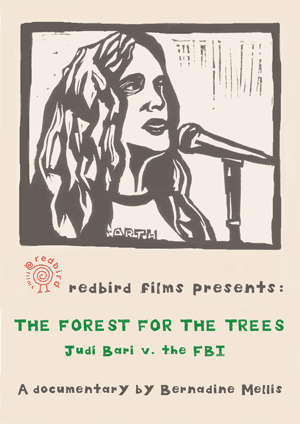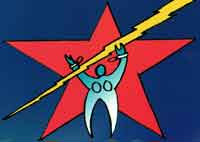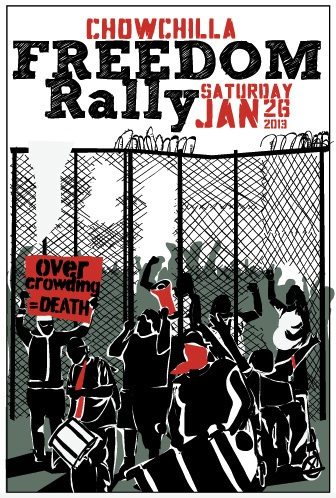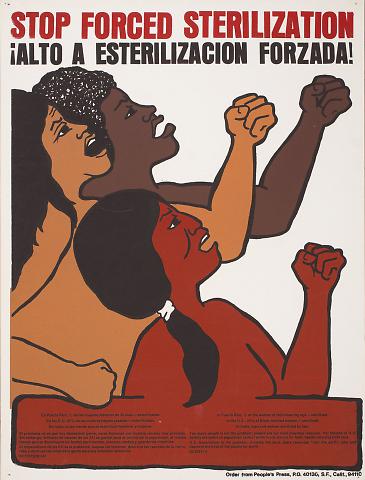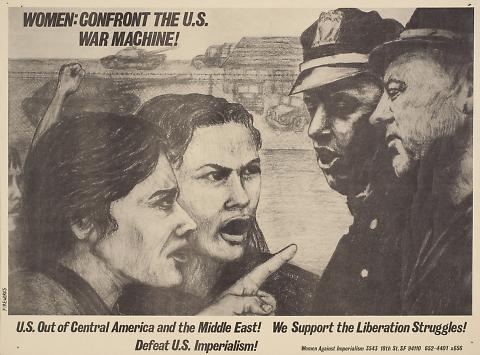Gender and Sexuality
This collection features materials from a number of sources focusing on struggles revolving around gender and sexuality. These struggles are not separate from larger struggles for liberation but specifically incorporate unique voices and perspectives.
Subcollections
-
Connexions
Connexions is the collective product of feminists of diverse nationalities and political perspectives committed to contributing to an international women\'s movement. -
Feminist and Lesbian Politics: Monographs-Periodicals-Articles
This collection contains materials focusing on radical feminist and lesbian politics. While diverse in medium and subject matter, this collection contextualizes women’s liberation highlighting issues of class, race, sexuality and imperialism. -
Materials shot and collected in the making of The Forest for the Trees
Raw materials from the documentary "The Forest for the Trees" which details the amazing story of the fight to clear Earth First! activist Judi Bari's name after her car was bombed and she was arrested as a terrorist. -
Out of Control: Lesbian Committee to Support Women Prisoners
Out of Control (OOC) was a self-supporting committee formed in 1987 to organize resistance to the Lexington Control Unit for women. -
Prisons - Women
This collection contains materials relating to the specific conditions, challenges and struggles facing women in prison. Topics are varied but materials include conference papers, informational materials, legal perspectives and audio recordings. -
Programs produced by Judy Gerber and Laurie Simms
This collection contains grassroots radio programming produced by Judy Gerber and Laurie Simms. This programming primarily occurred during the 1980s and 1990s. -
Sterilization
This collection contains materials focusing on the sterilization of women and efforts to resist this practice. -
Violence Against Women
This collection contains materials focusing on violence against women. Specific topics covered include women who fight back against their abusers, rape, pornography, sexism and self-defense. -
Women Against Imperialism
Women Against Imperialism was a grassroots, feminist, anti-imperialist solidarity organization formed in San Francisco in 1981. Women Against Imperialism’s work primarily consisted of direct action organizing and political education activities.
Documents
Date: 1/28/1979Call Number: JG/ 006Format: 1/4 7 1/2 ipsProducers: Judy GerberCollection: Programs produced by Judy Gerber and Laurie Simms
"Her Wits About Her" Dale Groves and Denise Kannin read from their book of stories about "women who resist, successful self defense stories"
Call Number: JG/ 067Format: CassetteProducers: Judy GerberCollection: Programs produced by Judy Gerber and Laurie Simms
bell hooks speaks at a conference on masculinity and feminism from 1990, where she references her fourth book, Yearning, as well as different depictions of masculinity in popular culture, especially television and film. Specific topics hooks addresses are that all women and men long to be loved and long to be free, socialization of black males versus white males, and how the media and popular culture perpetuates gender stereotypes. bell hooks concludes by saying the feminist transformation can heal men by deflecting focus on power and moving the focus to pain. Following her lecture are quick speeches and by Patricia Merchant, an Episcopal priest, John McDonald, founder of a Canadian AIDS support group, and Claude Franklin, a professor of sociology at Ohio State.
Date: 4/9/1994Call Number: JG/ 068Format: CassetteProducers: Judy GerberProgram: Trafficking in WomenCollection: Programs produced by Judy Gerber and Laurie Simms
Ninotchka Rosca is a renowned feminist, political prisoner and human rights activist. This is a recording of a lecture she gave in 1994 about the disastrous effects of trafficking women throughout the globe as well as the connection between the military and commercial sexual slavery. Her discussion focuses on women who are exported from Thailand and the Philippines including the history of exporting women, widespread diseases, the targeted exploitation of young girls, the connection to the exportation of domestic servants, and mail-order brides. Following her lecture is a short question and answer period.
Date: 4/9/1994Call Number: JG/ 069Format: CassetteProducers: Judy GerberProgram: Trafficking in WomenCollection: Programs produced by Judy Gerber and Laurie Simms
Ninotchka Rosca is a renowned feminist, political prisoner and human rights activist. This is a recording of a lecture she gave in 1994 about the disastrous effects of trafficking women throughout the globe as well as the connection between the military and commercial sexual slavery. Her discussion focuses on women who are exported from Thailand and the Philippines including the history of exporting women, widespread diseases, the targeted exploitation of young girls, the connection to the exportation of domestic servants, and mail-order brides. Following her lecture is a short question and answer period.
Call Number: JG/ 070Format: CassetteProducers: Judy Gerber, Lisa RudmanProgram: KPFACollection: Programs produced by Judy Gerber and Laurie Simms
This is a collection of different interviews and recordings of female political prisoners from around the world. Lisa Rudman collages them together to show the injustice towards political prisoners and to highlight some of the many tactics used by the US government and prison system to get information out of political prisoners.
Rudman defines political prisoners and interviews Laura Whitehorn and Linda Evans and speaks about their cases and the circumstances leading to their imprisonment.
The other political prisoners interviewed on the tape are: Dora Garcia, active in the national liberation struggles in the US colony of Puerto Rico; Mercedes Algado, a refugee active in the FSLM and FDR in El Salvador; Elizabeth Sebego, active in the Pan African Congress; Assata Shakur, active with the Black Panthers and now a refugee in Cuba; a Filipina imprisoned for her work with the church.
Call Number: JG/ 071Format: CassetteProducers: Judy GerberProgram: AIDS in FocusCollection: Programs produced by Judy Gerber and Laurie Simms
This is a short recording from the Care Fair for women of color with AIDS. Black women are one of the fastest growing population of those contracting AIDS. At the time of this recording, however, much of the research on HIV and AIDS was done on men, so the differences in symptoms and signs had not been discovered. There is an interview with Dayson Dixon, a Black women living with AIDS and she speaks about the lack of services available for those with AIDS and their families. She echoes the concern that there needs to be more research done on how HIV and AIDS affects women and especially Black women. Janet Cleveland, a copy editor at The Atlanta Journal-Constitution speaks as well.
Call Number: JG/ 072Format: CassetteProducers: Judy GerberProgram: AIDS in FocusCollection: Programs produced by Judy Gerber and Laurie Simms
The tape begins abruptly in the middle of a lecture on AIDS. The taping is from the same conference as JG/LS 071. What is primarily on the tape is a concert performed by two feminist folk musicians Joyce and Jackie. It is about forty-five minutes of their music which such songs as “Higher Ground” and “Sisters of the World.”
Date: 4/2/1994Call Number: JG/ 073Format: CassetteProducers: Judy GerberProgram: Camp Sister SpiritCollection: Programs produced by Judy Gerber and Laurie Simms
Camp Sister Spirit is a conference which took place at the Women’s Building in San Francisco in 1994. It is a conference between many of the organizations and NPOs that deal with queer issues and/or women’s rights. Sister spirit is defined as a call to action so that something can be built together to create permanent, grassroots change. The speakers are from diverse organizations and speak about ways to create collective change. Diedra McCalaugh (sp?) is a feminist singer/songwriter from Berkeley and performs songs from her album, “Everyday Heroes and Heroines”.
Date: 4/2/1994Call Number: JG/ 074Format: CassetteProducers: Judy GerberProgram: Camp Sister SpiritCollection: Programs produced by Judy Gerber and Laurie Simms
Camp Sister Spirit is a conference which took place at the Women’s Building in San Francisco in 1994. It is a conference between many of the organizations and NPOs that deal with queer issues and/or women’s rights. Sister spirit is defined as a call to action so that something can be built together to create permanent, grassroots change. The speakers are from diverse organizations and speak about ways to create collective change. On this tape many of the speakers talk about the need for increasing the public lesbian community through demonstrations and gatherings. This recording follows JG/LS 073.
Call Number: JG/ 077BFormat: Cass BProducers: Judy GerberProgram: A Defiant HeartCollection: Programs produced by Judy Gerber and Laurie Simms
In celebration of International Women's Day, 1991. Readings from Angela Bronstein's 'Triple Struggle: Latin American Peasant Women': an account of Rosa Dominga, a Bolivian peasant women's organizer, on hardships faced by her fellow women and their struggle for a national women's congress. "Hay una Mujer," a song by Ronnie Gilbert and Holly Near. Reading of a poem by a female Puerto Rican Revolutionary and of a poem, "Expectation," by Assada Shakur, imprisoned black revolutionary. Report of protests at prisons to commemorate International Women's Day. Speech by Linda Evans, female political prisoner, antiwar protester. Evans declares herself an anti-imperialist prisoner, supports women's and lesbian liberation, cries out against the Middle East war and against the unjust U.S. criminal justice system.



